#ubuweb
Explore tagged Tumblr posts
Text

UbuWeb a website I have used many many times. Is back.
Check them out www.ubu.com
186 notes
·
View notes
Text
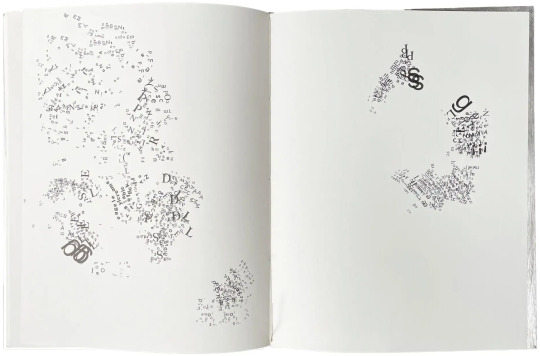
From: Johanna Drucker, Stochastic Poetics, Druckwerk and Granary Books, New York, NY, 2012 [© Johanna Drucker]
(UbuWeb, Visual Writing, ubu editions, 2013, pdf here)
#graphic design#art#poetry#concrete poetry#visual poetry#visual writing#book#johanna drucker#druckwerk#granary books#ubuweb#2010s
35 notes
·
View notes
Text
Ubuweb still has MP3’s of the entire run of Brian Eno’s shortlived label, Obscure Records—-all free
They’re all worth hearing, but my favorites are
No.1, Gavin Bryars “Jesus Blood Never Saved Me Yet / The Sinking Of The Titanic”, an early classic in (post? Whatever)-minimalism & found sound
No 3., Eno’s own album Discreet Music
No 5, Voices and Instruments by Jan Steele and featuring some of Cage’s beautiful songs
No 7, Music from The Penguin Cafe
And no 10, Harold Budd’s Pavillion of Dreams
If you like Eno’s ambient work there’s probably something here you’ll love
37 notes
·
View notes
Text
Is Ubu closed?
Download whatever you can, Ubu's been up more than it's been down, but it is not possible that it will be there forever.
as Kenneth Goldsmith has always said, including as recently as yesterday, "Don’t bookmark. Download. Hard drives are cheap. Fill them up with everything you think you might need to consult, watch, read, listen to, or cite in the future."
Three hours after also saying, "Let's keep UbuWeb well alive!" which, what
5 notes
·
View notes
Text
As of 2024, UbuWeb is no longer active. The archive is preserved for perpetuity, in its entirety.
Se trata del mayor repositorio de arte de vanguardia en línea: UbuWeb. Fundado en 1996 por el poeta Kenneth Goldsmith, esta biblioteca pirata alberga cientos de miles de obras de avanzada de todos los campos expresivos, una fuente de consulta inagotable para creadores, investigadores y curiosos de las formas marginales de expresión ( Revista La Tempestad 21 de mzo de 2024)
2 notes
·
View notes
Text
Listen to a recorded document of the conceptual exhibition 'Art by Telephone' at Chicago's Museum of Contemporary Art in 1969.
Transcription excerpt: Artist unknown.
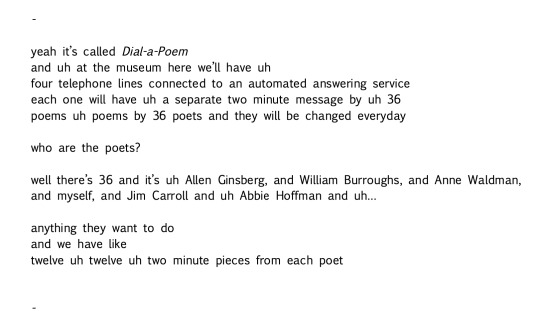
Inspired in part by Laszlo Moholy-Nagy's “telephone pictures” (for which the artist dictated his design for works over the phone to a fabricator, emphasizing the fact that an intellectual approach to the creation of art was not inferior to an emotional approach), Art by Telephonewas an extremely influential conceptually driven exhibition in the MCA's early history. Occurring at a time when the art world was moving away from minimalism and in a more conceptual direction, Art by Telephone asked artists from the United States and Europe to communicate their ideas for artworks over the telephone to MCA curator David H. Katzive. MCA staff then executed the works based on the artists' oral instructions, avoiding all blueprints and written plans. After six weeks, all of the works exhibited in Art by Telephonewere either destroyed or disposed of by the museum.
Some of the artists involved, such as Richard Hamilton and Wolf Vostell, approached the project with a more literal interpretation of the thematic. Vostell mailed a calendar of changing phone numbers from Germany. Visitors dialed the numbers to receive instructions for one-minute happenings. A Sol LeWitt wall drawing was produced with the help of assistants, and Robert Smithson constructed a varied version of his “non-site,” asking that a pile of cement be poured down a steep hill and then photographed for display in the galleries.
The exhibition included installations that relied heavily on audience participation, such as Arman's famous trashcans. The artist asked people to contribute their own waste to the enclosed Plexiglas area. Once it was filled to the brim, the work was considered complete.
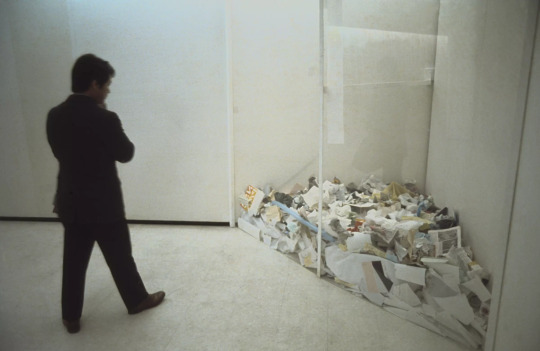
Others, such as William Wegman's Third Day, embraced natural occurrences. Third Dayconsisted of a trough, built in the shape of the letters spelling out “third day,” that was filled with water and covered with vermiculite. The water evaporated in three days, exposing the words engraved on the floor.
The exhibition was dedicated to Marcel Duchamp and John Cage, who declined to participate. However, most if not all artists who did accept the museum’s invitation, were influenced by one or both in some way, accepting the idea of process and experience over finished object.
Artists exhibited in Art by Telephone included: Siah Armajani, Arman, Richard Artschwager, John Baldessari, Iain Baxter, Mel Bochner, George Brecht, Jack Burnham, James Lee Byars, Robert H. Cumming, Francois Dallegret, Jan Dibbets, John Giorno, Robert Grosvenor, Hans Haacke, Richard Hamilton, Dick Higgins, Davi Det Hompson, Robert Huot, Alain Jacquet, Ed Keinholz, Joseph Kosuth, Les Levine, Sol LeWitt, Robert Morris, Bruce Nauman, Claes Oldenburg, Dennis Oppenheim, Richard Serra, Robert Smithson, Guenther Uecker, Stan VanDerBeek, Bernar Venet, Frank Lincoln Viner, Wolf Vostell, William Wegman, and William T. Wiley.
#artbytelephone#museumofcontemporaryartchicago#conceptualart#inspired by John cage#inspired by duchamp#experimental proccess#artist as Ikea leaflet#1969#secondary research#ubuweb
3 notes
·
View notes
Text
guy debord @ ubuweb
Guy Debord (1931-1994) Critique de la séparation (1961) Hurlements en faveur de Sade (1952) In Girum Imus Nocte Et Consumimur Igni (1978) Refutation of All the Judgements, Pro or Con, Thus Far Rendered on the Film “The Society of the Spectacle” (1975) Society of the Spectacle, Part 1 (1973) Society of the Spectacle, Part 2 (1973) Guy Debord, son art et son temps (1995) Society of the…

View On WordPress
1 note
·
View note
Text
Another one bites the dust: as of 2024 UbuWeb is no longer active. It will remain, for now, as an archive.
0 notes
Text
digital horror fans when I show them Genesis (1988/1991) by Peter Rose on ubuweb
6 notes
·
View notes
Text
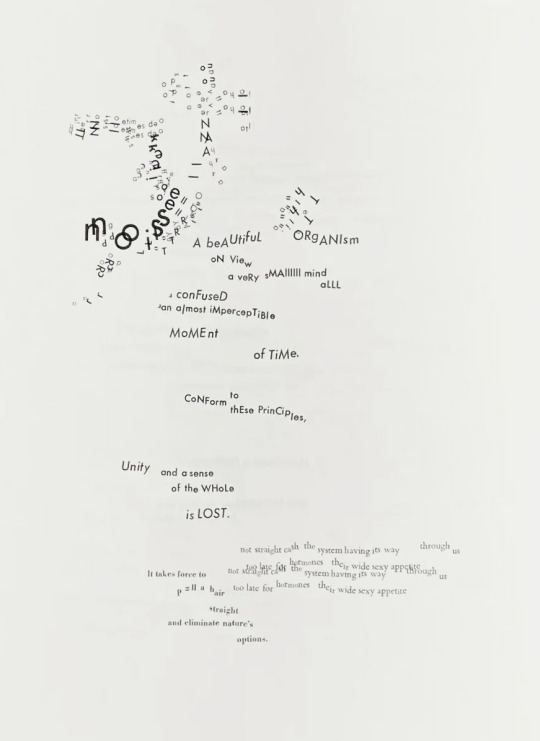
From: Johanna Drucker, Stochastic Poetics, Druckwerk and Granary Books, New York, NY, 2012 [© Johanna Drucker]
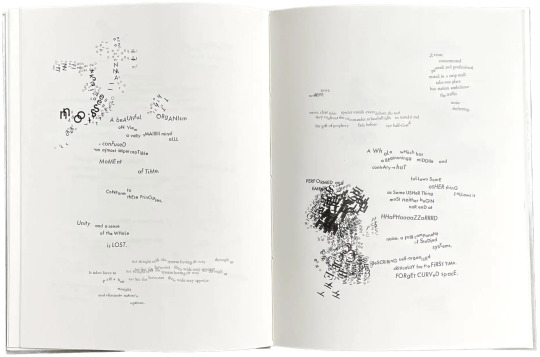
#graphic design#art#poetry#concrete poetry#visual poetry#visual writing#book#johanna drucker#druckwerk#granary books#ubuweb#2010s
39 notes
·
View notes
Text
can i get a criterion merce cunningham videodance box set please pretty pleease
#frustrating how much stuff is completely inaccessible! let me pay money for this wtf!!!#even ubuweb is bone dry
0 notes
Text

#other minds archive#lotta incredible stuff here…kinda like finding Ubuweb for the first time#this recording is really nice#birdsong
6 notes
·
View notes
Text

0 notes
Text
Lots of VC questions recently. Someone emailed about what they should be engaging with to develop their artistic voice. Here's my answer:
In terms of guidance, Werner Herzog, who is admittedly a weirdo, said that the best thing a film student can do is go backpacking cross country, which I would never do. But the point he was ultimately making is that life experience is more important than anything a film school can teach you. Your artistic voice develops more sharply the more intune you are with the world; all the film stuff is superfluous really. So that would be my major advice. Live life! Be open to all sorts of experiences.
Outside of that I would say to read and watch anything and everything you can get your hands on. Especially stuff that has nothing to do with film. Be curious, which is to say non-judgemental. Sitting through stuff that you have no interest in or actively hate is good! It develops your taste in ways that seeking out only what you like can never do. It also expands your horizons and teaches you how much you actually don't know about anything. Keeps you humble. You'll be surprised 5 years on how something that you had no interest in is super relevant to what you're trying to do.
I'll drop some recommendations later but something you are going to run into is paywalls and exorbitant costs. Scihub, Libgen, and PaywallReader can be your friends in this regard. The more niche something is, the less mirrors there are. Investing in an internet audio/video ripper is essential. Rip often and indiscriminately. Nothing is safe unless you triplicate it. And if you can't afford hard drives, dummy alphabet accounts are the next best thing. Also, footnotes and reference lists are treasure troves of breadcrumbs.
The standard VC reading list includes: Reel to Real, The Devil Finds Work, Playing in the Dark, Young British & Black, Ways of Seeing (also a documentary), Orientalism, Film Manifestos and Global Cinema Culture, Questions of Third Cinema, Hollywood & Counter Cinema, Figures Traced in Light, Parallel Tracks, and Basho: The Complete Haiku
Hundreds of films can be found on Solidarity Cinema. Cinema of the World has a deep archive but you need to have space and a nitrofile account to download most films, but you can snipe a few films here and there (or look for them elsewhere). Rarefilmm updates semi-regularly and you can stream the films; they are now more active on twitter and are even taking requests. Some state-sponsored film industries have robust presences on youtube with english subs: Russia's Mosfilm/FUSE Mosfilm, Canada's NFB, the Korean Film Archive, Native People's Media. There's UbuWeb for all your avant-garde needs. There's FIlmmaker's Co-Op (pay-per-view), Paper Tiger Television, and Deep Dish Television for NYC indie stuff. AfroMarxist has a fair amount of political documentaries. NMAHC has an archive that houses the work of Chamba Productions and some of Pearl Bowser's stuff. And of course there's the legendary MikeD of ReelBlack. It's a crap shoot but some filmmakers and/or their estates make work available free online (Leo Hurwitz and Julie Dash come to mind). I'd recommend a Kweli TV subscription for black film, and never be surprised by what you can find on youtube or tubi!
This is probably super overwhelming but the joy of being an autodidact is the thrill of discovery so peruse at your leisurely interest. The internet is your oyster if you know how to use it! Back in my day hardly any of these sites existed and the ones that did weren't as robust as they are now. I've had to frankenstein whole movies from various clips posted in 144p on youtube 😩
I used to do a couple of themed months a year where I'd read and watch as much as possible about a filmmaker, genre, or movement that interested me. I'd spin a globe to learn a little about a random country's cinema. Best of lists/canons don't really mean much but they are good sources of stuff to at least be aware of.
43 notes
·
View notes